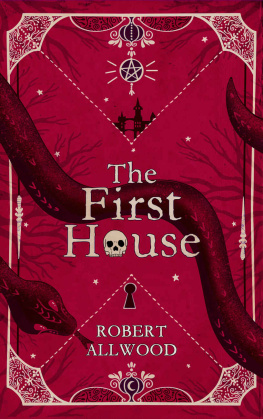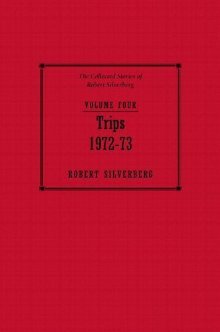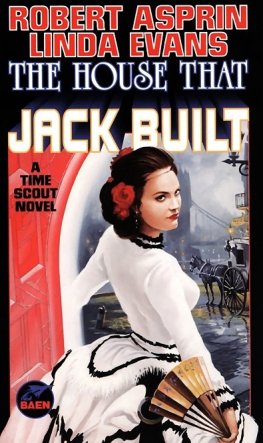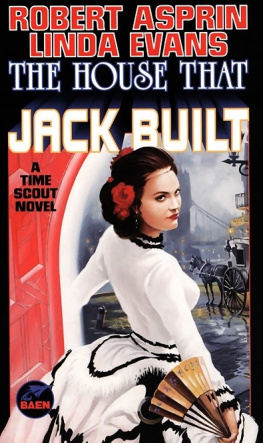Robert Allwood [Allwood - The First House
Here you can read online Robert Allwood [Allwood - The First House full text of the book (entire story) in english for free. Download pdf and epub, get meaning, cover and reviews about this ebook. year: 2019, publisher: Amazon Publishing, genre: Detective and thriller. Description of the work, (preface) as well as reviews are available. Best literature library LitArk.com created for fans of good reading and offers a wide selection of genres:
Romance novel
Science fiction
Adventure
Detective
Science
History
Home and family
Prose
Art
Politics
Computer
Non-fiction
Religion
Business
Children
Humor
Choose a favorite category and find really read worthwhile books. Enjoy immersion in the world of imagination, feel the emotions of the characters or learn something new for yourself, make an fascinating discovery.
- Book:The First House
- Author:
- Publisher:Amazon Publishing
- Genre:
- Year:2019
- Rating:4 / 5
- Favourites:Add to favourites
- Your mark:
- 80
- 1
- 2
- 3
- 4
- 5
The First House: summary, description and annotation
We offer to read an annotation, description, summary or preface (depends on what the author of the book "The First House" wrote himself). If you haven't found the necessary information about the book — write in the comments, we will try to find it.
Robert Allwood [Allwood: author's other books
Who wrote The First House? Find out the surname, the name of the author of the book and a list of all author's works by series.
The First House — read online for free the complete book (whole text) full work
Below is the text of the book, divided by pages. System saving the place of the last page read, allows you to conveniently read the book "The First House" online for free, without having to search again every time where you left off. Put a bookmark, and you can go to the page where you finished reading at any time.
Font size:
Interval:
Bookmark:

First published in 2019 by Amazon Publishing
amazonpublishing.amazon.com
kdp.amazon.com
Robert Allwood 2019
The right of Robert Allwood to be identified as the Author of the Work has been asserted by him in accordance with Copyright, Designs and Patents Act 1988.
All rights reserved. Apart from any use permitted under UK copyright law no part of this publication may be reproduced, stored in a retrieval system, or transmitted, in any form or by any means without the prior written permission of the publisher, nor be otherwise circulated in any form of binding or cover other than that in which it is published and without a similar condition being imposed on the subsequent purchaser.
All characters in this publication are fictitious and any resemblance to real persons, living or dead, is purely coincidental.
ISBN: 9781080154500
Cover illustration by Mirella Santana 2019
mirellasantana.com.br @mirellasantana3
Map illustration by Djinn Black 2019
@djinninthebox
For my family, and everyone who believed, thank you.
"For, as you know, no master of a household
Has all of his utensils made of gold;
Some are wood, and yet they are of use.
Chaucer
Part One
The Sun
London, Winter, 1771
O n the anniversary of her mothers death, Lady Eleanor Saville, wife of Lord William Saville, gave birth to twins. Everyone was bound to the mansion on that day: staff, wellwishers, Lords and Ladies, no exceptions. However, by late morning, those bound had grown tired of waiting, cleaning, or worrying. Written in the houses official records, it was a day of anxiety and nervous talk among staff the more senior of which simply kept themselves busy, lips sealed, faces askance. Upstairs, in the afternoon, Lady Eleanor Saville found herself rolled into bed, water broken, her upper body strapped under thin blankets, and her breasts covered in modesty. The boisterous midwife and her dour assistant busied themselves around her, preparing cloth, dishes, water and instruments of labour.
Hours later, when the contractions quickened, and the cramps came full force, Eleanor smoothed her matted hair back and gripped the mattress. As it built ever upwards and needles sparked under her skin, Eleanor gritted her teeth, her face condensed in agony. Under suggestion, she raised her legs further still, and wandered her gaze onto the ceiling. She screamed fiercely at nothing. The pain itself rose to a crescendo; it strangled her body with hot ropes of agony that felt as though she was being torn in two, and wished she was. With a final cry, and enormous relief, Eleanor finally gave birth. For a moment, she turned her head towards the window and noted it was a frosted yellow sky, the colour of soured milk. The first child, Sophia, came through stubborn and crying. She screamed until rubbed down with soft cotton and nestled in brushed fur. Seconds old, and yet already used to the finer things in life. The second, Sarah, came when the storm finally broke over the Darkwater. It shed sleet, blew chill wind, and bore glum thoughts. This child arrived quiet and content. The only signs of life were two curious oval eyes that absorbed the details of everything around her.
When Eleanors daughters were together with her, the peace was greater than she had imagined. She held them, one in each arm, to her covered breast and nuzzled them before the nervous gathering present. The staff each in turn gave their blessings, and left mother and children alone to bond, to see to the needs of Lord Saville (who took dim view of these matters). That night, she slept snug with her two winter children. She dreamt of strange things: pale men in grey cloaks, a golden warrior melting, a ship of fog, a tower cracked by sun. She saw a coast dominated by a single oak crowned by bright coloured pennants. If she couldnt sleep and see these portents clearly, Eleanor would sing songs which her mother had taught her in secret, old songs of a young witch, who falls in love with a thief, and carries on their bloodline of women lucky enough to escape the witch hunts.
Women who could shape the fortunes of many, but could not divine their own.
The Emperor
Lamb's Wharf, London, 1777
C ertainly, it was becoming more apparent that errant thoughts in his mind were the bane of progress; slippery muses that eluded his mental grip, that convinced him he was going mad in some small way. But, every time he woke anew, he found that they always faded into the aether, going to the same place all ideas that were never written down go. He rubbed his worn eyes, scrubbing the sleep from their corners. Today, as with yesterday, his mind would not be still, it fired and sparked, greedy for action. He found that the only remedy for such a cascade was to put plans into motion, or so his father had told him. Rest in peace, dear father.
Lord Percy Turner sat up with his dream still on repeat in his mind. It was of the city around him, and its preservation. The city was many things. It was the key of the world, a monster of stone and industry, a haven for all people: paragons and rogues, queer and plain. Parasites. He loathed, no , hated , seeing it bleed. The culture, the money, the politics, thrown onto the butchers block and diced into tidy morsels. The interference of the Crown, and the foreign squeeze from west and east had cumulated into its degradation. He shuddered, and almost wept for his fair Lady London.
Percy took water from a basin placed on the night stand and drew apart the curtains. It was just after dawn, and at what thin light bled into the master bedroom, he smiled.
A soft knock at the door. 'My Lordlady Isolde is here.'
Percy nodded at nothing. 'Succinct. Show her the study Harris and bring a small breakfast also.'
'Will you be eating with the lady my Lord?'
'No but, see that she is refreshed.'
'Very good my Lord.'
Percy washed, dressed himself and scented his clothes. A delicate little ritual. What silly rules and regulations he followed as a person. He smiled again. Just a normal man in here, he thought, out there I'm importance. A rule to follow. Not so silly, not so small and delicate. A title, a name. He sighed and balled his fists. No more of this. I must stop listening to nonsense. The plan must have focus. I must rescue my city.
He walked slow on purpose, a chance to play out greeting Isolde in his mind. Another change to his posture or speech, and another juxtaposedon top. In his experience, it was always best to lead a conversation, rather than be second. Go on the attack. You have advantage. You direct the converse, the flow of words. Power. Rules. Regulation. Silly. Little. Words. Percy stopped before the threshold of the room and straightened his back.
Isolde sat in the study, at study, with one of his books folded open neatly in her lap. She had grown into a singular young woman. Always on the verge of being insolent from what he remembered of her; a victim of a sad and lonely childhood. However, she also brought about a fascination. The way her quick eyes noted lines and marks on your face, the way her character was apparent in every motion her body produced; a creature of natural charisma. Isolde's hood fell back further as she realised Percy. Her alabaster hair was tucked tight into a bow. She rested two fingers across her cheek, the other hand balancing the book on her belly. She did not rise.
'You truly have the most interesting works, Lord Turner,' she began.
She was first to speak then. 'You can keep it, if you like. I've no time for reading as of late, my lady.'
Percy frowned as the minx winked her flat brown eyes at him. For a second, the briefest moment, he saw exactly what she was thinking, and knew, he had lost all advantage in this conversation. She could probably spar with the best of them. He laughed at the thought as the butler brought his meal. A small sausage, delicate toast, a little glass of coffee. Isolde, in turn, watched Turner eat with the most neutral expression on a person she had ever witnessed.
Font size:
Interval:
Bookmark:
Similar books «The First House»
Look at similar books to The First House. We have selected literature similar in name and meaning in the hope of providing readers with more options to find new, interesting, not yet read works.
Discussion, reviews of the book The First House and just readers' own opinions. Leave your comments, write what you think about the work, its meaning or the main characters. Specify what exactly you liked and what you didn't like, and why you think so.












